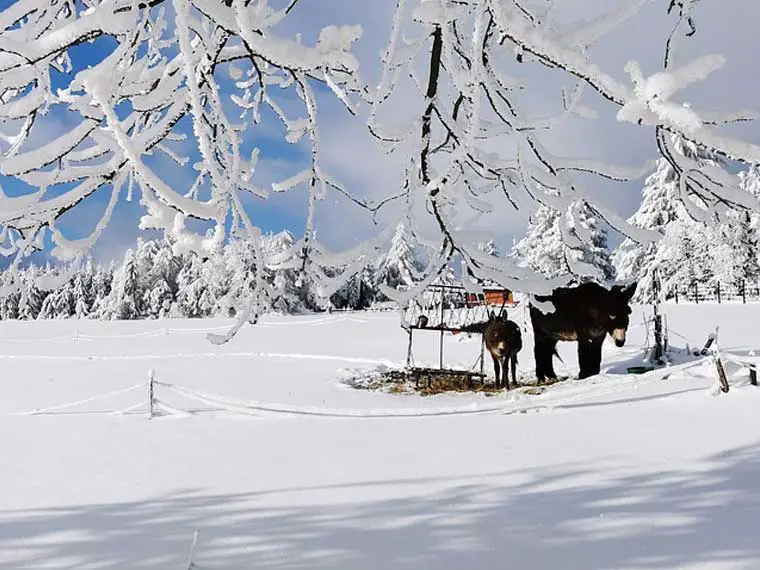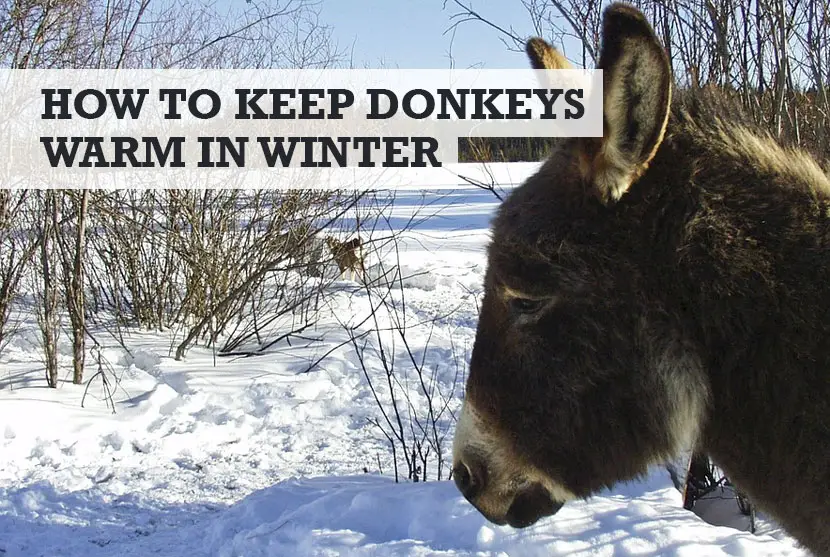Donkeys originate from warm, arid regions of North Africa and the Mediterranean. These areas are cool in winter but nowhere near as harsh as in the temperate zones further north, where snowfalls and sub-zero temperatures are common occurrences.
Because of this, you should think carefully about the cold when keeping donkeys during winter. Knowing what your animals need, how to keep a donkey warm in winter essential.
In this guide I will explain how cold is too cold for donkeys. You will also learn whether they need blankets and rugs, and what to feed them in the wintertime to keep their energy and heat levels up.
How to keep donkeys warm in winter
Before I start, something to be aware of. If you have healthy donkeys that have acclimatised to cold conditions, they will not need pampering and can be kept outdoors on most days in the winter.
The most important considerations will be keeping them fed, dry and sheltered from the wind, and giving them cover overnight.
A study done by the University of Portsmouth found that donkeys are more likely to react to the cold than mules and horses.
Equine behaviour expert Dr Leanne Proops explains how donkeys seek shelter far more than horses when it starts to rain. By contrast, the donkeys enjoy the warm sunshine much more.
The sensitivity of mules to higher temperatures and sunlight may be due to the geographically different evolution of horses and donkeys and their adaptations to different climates.
In a nutshell, you should take steps to keep donkeys warm in winter.

How cold is too cold for donkeys?
According to that research, it’s too cold for donkeys when the temperature drops to below 14 degrees. Donkeys will also let you know that it too cold for them, long before the situation becomes dire, by shivering, braying at night and seeking shelter.
Keeping donkeys in winter
Take extra special care of your donkey in the cold winter months. As you will know, you can’t keep them indoors all the time, as they need space to move around, and exercise which is vital for their health.
They also have the good sense to keep out of the rain and wind if they can find shelter. However, there are measures that you can take to make the cold weather experience more pleasant for them.
A healthy donkey will have a healthy coat. The Portsmouth University study showed that the coats on donkeys are thinner and shorter than those of horses and ponies. They also found that their coats do not vary in thickness as much, throughout the year.
However, if a donkey is in good health and has had time to acclimatise to very cold conditions, its fur should grow sufficiently fluffy to keep it warm in winter. Keep your donkeys healthy by feeding them the right food, ensuring that they are dewormed regularly and eliminating other parasites that can negatively affect their condition.
In snow or icy weather, you can tell if a donkey’s body is able to retain heat efficiently by observing whether snow and frost melts in its fur. If they do melt, it means that your donkey is losing heat and needs help in dealing with the cold.
Did You Know? Donkeys need enough space to remain happy and healthy. Experts say that donkeys need at least half an acre each.
Do donkeys need blankets in the winter?
Young and elderly donkeys, as well as those who are ill or are not used to a cold climate, may need to be covered with rugs or blankets to keep them warm in winter. In extreme cases, some donkeys may benefit from wearing hoods to keep their heads warm.
However, if a donkey’s blanket gets wet, remove it immediately and replace it with a spare dry one. Remove the blanket and brush its fur daily, to prevent fungal and bacterial growth.
Caring for a donkey in winter
Some animals have problems when snowballs develop in their fur. These cause skin irritation, and you may find your donkeys biting at them. In doing so, they may inadvertently nip themselves and cause injury. If you notice snowballs developing, remove these immediately.
It is not good for donkeys to have wet feet for any length of time, in warm or cold weather. Keep them away from muddy paths and soggy paddocks, and ensure that their daytime and overnight shelters are dry at all times.
If mud or rain freezes, it becomes slippery and hazardous to walk on. This is another reason why your donkeys should avoid such areas.
In freezing weather, it is important to ensure that mud and ice do not cake in or around your donkeys’ hooves. This could cause the hooves to become unevenly shaped, making it difficult for the animals to get traction when walking. Check their hooves regularly, clearing away any mud or ice. If necessary, smear the hooves with petroleum jelly to prevent further ice build up. This needs to be repeated at least once a week in a cold spell.
Keeping donkeys warm in winter outdoors
Your major concerns for donkeys, that are kept outside during a cold winter, are that they stay dry and are able to escape from the wind. In addition, they need access to fresh drinking water and a steady supply of food to nibble on to keep their strength up.
To prevent wet feet, ensure that their paddocks are well drained so that they dry quickly after it rains or the snow thaws. If the pathways between the donkeys’ daytime and night time accommodation areas tend to become muddy from being trampled, consider paving them or covering them with wood chip or similar substance.
Create windbreaks in the pastures to prevent the wind speed from building up. Even a slight breeze can create a wind chill that makes the temperature feel significantly lower than it actually is.
Give your donkeys access to a shelter where they can gather to escape inclement weather. The shelter should have a sloping roof that prevents snow build up, and walls on at least three sides. Ensure that each donkey has enough room to move around comfortably under the shelter.
In an emergency, donkeys can go for up to three days without drinking water. Nevertheless they would prefer to have access to a reliable source of fresh drinking water, should they feel thirsty. If sub-zero temperatures persist, their water is likely to freeze or form a layer of ice across the surface.
To prevent this, place their water point in a spot that is sheltered from the wind and likely to catch any available warmth from the sun. Water is less likely to freeze in rubber buckets than in metal or plastic.
Also, the larger the bucket, the slower the water will freeze. Insulating the buckets with tyres or straw also helps to alleviate the problem.
Under normal circumstances, donkeys should eat little and often, so that they can derive a constant supply of energy from their low-calorie diet. This is even more important in cold weather, as they will use more energy in order to keep warm.
Do not be tempted to fatten your donkey up for winter by giving them a high calorie diet. This will cause them to develop other health problems as their metabolisms are not designed to process rich food. You could switch to a low grade hey or a richer straw but a high calorie diet is dangerous.
Keeping donkeys warm in winter in stables
Donkeys like to sleep in a safe environment. If they do not feel secure or do not have enough room to lie down in, they will snooze lightly standing up.
For deep energizing sleep, it is necessary to provide them with warm, dry, but well-ventilated sleeping quarters, so that they feel comfortable enough to lie down. In a herd of donkeys, some may choose to stand, regardless of the luxuries you provide, so do not be overly concerned.
Straw bedding is essential to insulate them from the cold of the floor. If they are to be kept indoors for a prolonged period due to a storm or similar event, you need to change the bedding often.
They will also need a steady supply of straw to chew on throughout the night in order to keep their energy and heat levels constant.
Fresh water is vital. Follow the anti-freezing steps set out above, and consider filling the bucket with warm water to start off with. Ensure that the container in which it is held is secure. If the water spills during a cold night, it could make the sleeping area damp and uncomfortable, and might even freeze, making the area colder and dangerous.
Several bodies in a barn or similar enclosure should warm up the air. Exclude any cold draughts from entering through the doors and prevent warm air from disappearing out through the roof.
A ceiling may seem like an extravagance in a barn, but it is well worth it for the insulation it affords against extreme cold.
If you feel it is necessary to provide heating indoors, infrared lamps are the most efficient option. Make sure to keep any electric cords out of the way of curious donkeys.
What to feed donkeys in winter?
Experts on The Donkey Sanctuary website explain what to feed donkeys in winter by saying:
Donkeys need access to barley straw and are fed a controlled amount of hay or haylage according to their body condition. Others are grazed on specially designated winter grazing which allows the summer pastures time to rest and is beneficial for parasite control. In special circumstances old or sick donkeys eat additional high fibre feeds and supplements to help maintain their body weight. Donkeys with access to grass all year round won’t require much hay, even during the winter months.
Can donkeys stay outside in winter?
If the donkeys are accustomed to the climate, then yes, they can stay outside in winter. However, they will still need shelter for sleep and to guard against cold rain and snow.
Conclusion
Donkeys are relatively hardy creatures, but they do need to be kept warm in the winter. With a mix of the right food, shelter, and care, they will adapt to most winter conditions.
You might also like…
Image in header of a donkey in winter via https://pixabay.com/photos/donkey-winter-snow-cold-animal-215158/


